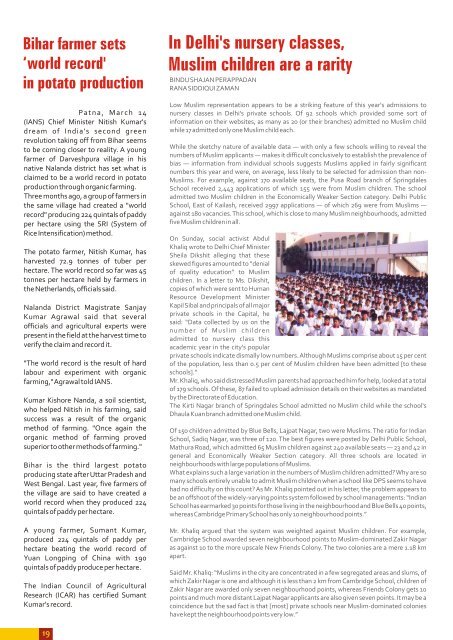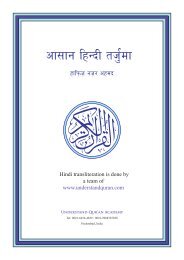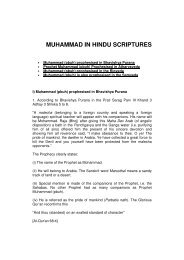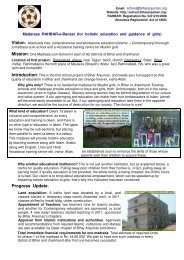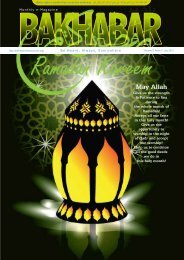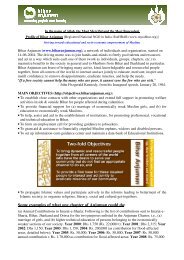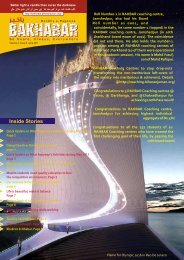You also want an ePaper? Increase the reach of your titles
YUMPU automatically turns print PDFs into web optimized ePapers that Google loves.
<strong>Bihar</strong> farmer sets<br />
‘world record'<br />
in potato production<br />
P a t n a , M a r c h 1 4<br />
(IANS) Chief Minister Nitish Kumar's<br />
dream of India's second green<br />
revolution taking off from <strong>Bihar</strong> seems<br />
to be coming closer to reality. A young<br />
farmer of Darveshpura village in his<br />
native Nalanda district has set what is<br />
claimed to be a world record in potato<br />
production through organic farming.<br />
Three months ago, a group of farmers in<br />
the same village had created a "world<br />
record" producing 224 quintals of paddy<br />
per hectare using the SRI (System of<br />
Rice Intensification) method.<br />
The potato farmer, Nitish Kumar, has<br />
harvested 72.9 tonnes of tuber per<br />
hectare. The world record so far was 45<br />
tonnes per hectare held by farmers in<br />
the Netherlands, officials said.<br />
Nalanda District Magistrate Sanjay<br />
Kumar Agrawal said that several<br />
officials and agricultural experts were<br />
present in the field at the harvest time to<br />
verify the claim and record it.<br />
"The world record is the result of hard<br />
labour and experiment with organic<br />
farming," Agrawal told IANS.<br />
Kumar Kishore Nanda, a soil scientist,<br />
who helped Nitish in his farming, said<br />
success was a result of the organic<br />
method of farming. "Once again the<br />
organic method of farming proved<br />
superior to other methods of farming."<br />
<strong>Bihar</strong> is the third largest potato<br />
producing state after Uttar Pradesh and<br />
West Bengal. Last year, five farmers of<br />
the village are said to have created a<br />
world record when they produced 224<br />
quintals of paddy per hectare.<br />
A young farmer, Sumant Kumar,<br />
produced 224 quintals of paddy per<br />
hectare beating the world record of<br />
Yuan Longping of China with 190<br />
quintals of paddy produce per hectare.<br />
The Indian Council of Agricultural<br />
Research (ICAR) has certified Sumant<br />
Kumar's record.<br />
In Delhi's nursery classes,<br />
Muslim children are a rarity<br />
BINDU SHAJAN PERAPPADAN<br />
RANA SIDDIQUI ZAMAN<br />
Low Muslim representation appears to be a striking feature of this year's admissions to<br />
nursery classes in Delhi's private schools. Of 92 schools which provided some sort of<br />
information on their websites, as many as 20 (or their branches) admitted no Muslim child<br />
while 17 admitted only one Muslim child each.<br />
While the sketchy nature of available data — with only a few schools willing to reveal the<br />
numbers of Muslim applicants — makes it difficult conclusively to establish the prevalence of<br />
bias — information from individual schools suggests Muslims applied in fairly significant<br />
numbers this year and were, on average, less likely to be selected for admission than non-<br />
Muslims. For example, against 170 available seats, the Pusa Road branch of Springdales<br />
School received 2,443 applications of which 155 were from Muslim children. The school<br />
admitted two Muslim children in the Economically Weaker Section category. Delhi Public<br />
School, East of Kailash, received 2997 applications — of which 269 were from Muslims —<br />
against 180 vacancies. This school, which is close to many Muslim neighbourhoods, admitted<br />
five Muslim children in all.<br />
An apple a day,<br />
keeps doctor away<br />
On Sunday, social activist Abdul<br />
Khaliq wrote to Delhi Chief Minister<br />
Sheila Dikshit alleging that these<br />
skewed figures amounted to “denial<br />
of quality education” to Muslim<br />
children. In a letter to Ms. Dikshit,<br />
copies of which were sent to Human<br />
Resource Development Minister<br />
Kapil Sibal and principals of all major<br />
private schools in the Capital, he<br />
said: “Data collected by us on the<br />
n u m b e r o f M u s l i m c h i l d r e n<br />
admitted to nursery class this<br />
academic year in the city's popular<br />
private schools indicate dismally low numbers. Although Muslims comprise about 15 per cent<br />
of the population, less than 0.5 per cent of Muslim children have been admitted [to these<br />
schools].”<br />
Mr. Khaliq, who said distressed Muslim parents had approached him for help, looked at a total<br />
of 179 schools. Of these, 87 failed to upload admission details on their websites as mandated<br />
by the Directorate of Education.<br />
The Kirti Nagar branch of Springdales School admitted no Muslim child while the school's<br />
Dhaula Kuan branch admitted one Muslim child.<br />
Of 150 children admitted by Blue Bells, Lajpat Nagar, two were Muslims. The ratio for Indian<br />
School, Sadiq Nagar, was three of 120. The best figures were posted by Delhi Public School,<br />
Mathura Road, which admitted 65 Muslim children against 240 available seats — 23 and 42 in<br />
general and Economically Weaker Section category. All three schools are located in<br />
neighbourhoods with large populations of Muslims.<br />
What explains such a large variation in the numbers of Muslim children admitted? Why are so<br />
many schools entirely unable to admit Muslim children when a school like DPS seems to have<br />
had no difficulty on this count? As Mr. Khaliq pointed out in his letter, the problem appears to<br />
be an offshoot of the widely-varying points system followed by school managements: “Indian<br />
School has earmarked 30 points for those living in the neighbourhood and Blue Bells 40 points,<br />
whereas Cambridge Primary School has only 10 neighbourhood points.”<br />
Mr. Khaliq argued that the system was weighted against Muslim children. For example,<br />
Cambridge School awarded seven neighbourhood points to Muslim-dominated Zakir Nagar<br />
as against 10 to the more upscale New Friends Colony. The two colonies are a mere 1.18 km<br />
apart.<br />
Said Mr. Khaliq: “Muslims in the city are concentrated in a few segregated areas and slums, of<br />
which Zakir Nagar is one and although it is less than 2 km from Cambridge School, children of<br />
Zakir Nagar are awarded only seven neighbourhood points, whereas Friends Colony gets 10<br />
points and much more distant Lajpat Nagar applicants are also given seven points. It may be a<br />
coincidence but the sad fact is that [most] private schools near Muslim-dominated colonies<br />
have kept the neighbourhood points very low.”<br />
19


